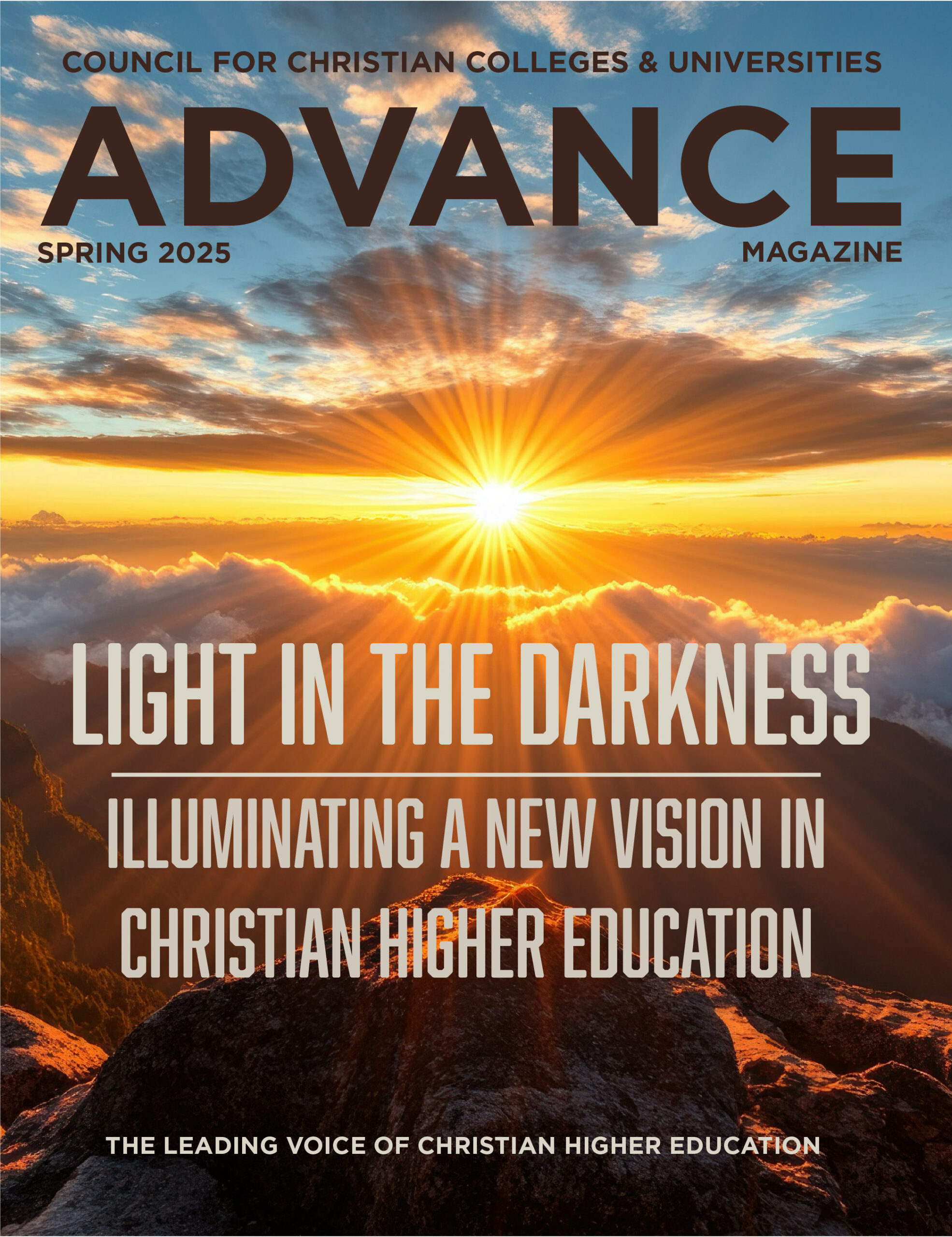Magazine
“The Christian college will not settle for a militant polemic against secular learning and science and culture, as if there were a great gulf fixed between the secular and the sacred. All truth is God’s truth, no matter where it is found, and we can thank him for it all.”
—Arthur Holmes, The Idea of a Christian College
When I began my college search as a rising high school senior, I did not consider Christian higher education. I planned to study science in college, and I dismissed religious colleges and universities because I assumed that they would not have good STEM programs. This assumption was largely due to my experience with Christian primary education; I grew up attending a classical Christian school where science was the weakest program. As graduation approached, I decided to apply exclusively to secular universities.
For many people, scientific rigor is not among the first things that come to mind when thinking about Christian higher education. There is an assumption in the wider culture that science—or other more technical endeavors—are not priorities in Christian scholarship. Some may even go so far as to say that Christians are anti-science, that to walk a life of faith and study science is to live a contradiction.
The assumption that Christians turn away from the more scientific, technical academic pursuits is disheartening. At its core, to study science, technology, engineering, and math is to dive deeper into the physical and rational laws that were divinely designed to govern the world around us—the world that was itself divinely designed for us to inhabit, explore, and steward. The curiosity and exploration that is fundamental to academia, and that births STEM study, is a reflection of how God created us to be: filled with a deep inner longing for truth. All scholarship is a search for truth, and every truth reveals more to us about the image of God. Therefore, every truth is worth seeking out, vitally including scientific and technical truths.
Christian colleges are, in fact, positioned to teach STEM subjects in a highly unique and valuable way, not striving to understand how the world works purely for the sake of understanding, but also to better know the One who designed it. To understand God’s creation and His intentional, ordered design is a divine calling. The wonder that can be found in the science lab, the curiosity provoked in the math classroom, or the understanding that dawns in the engineering lecture are all glimpses at a Creator who built it all and modeled us in His image, with logic, curiosity, and creativity. A STEM education at a Christian college is set apart in the way that it cultivates this attitude towards exploration: learning for the sake of God’s glory.
“By leading [the learned] life to the glory of God I do not, of course, mean any attempt to make our intellectual inquiries work out to edifying conclusions… I mean the pursuit of knowledge and beauty, in a sense, for their own sake, but in a sense which does not exclude their being for God’s sake. An appetite for these things exists in the human mind, and God makes no appetite in vain. We can therefore pursue knowledge as such, and beauty as such, in the sure confidence that by so doing we are either advancing to the vision of God ourselves or indirectly helping others to do so.”
—C.S. Lewis, Learning in War-Time
I am fortunate that my experience studying a science at a secular university allowed me to cultivate a God-glorifying attitude towards learning. My biggest anxiety in going to college was whether I would find good Christian community, and I had to work hard and step far out of my comfort zone to do so. I ended up with a group of Christian peers who were also working towards STEM majors, and by walking through my education with them and digging deeper into my own motivations for studying science, I developed a strong desire to know God better through my studies of the universe. I am incredibly thankful for my time in college and what these friends taught me, but I also recognize how much harder it was to find like-minded Christians at a secular university than it would be at a Christian institution. While my efforts were rewarded, it is a difficult barrier for Christian college students at secular institutions to overcome.
Over the past few years, I have learned that my early assumptions about Christian higher education were unfounded. As I have discovered through my time as a fellow at the CCCU, hundreds of Christian colleges across the country feature high-quality STEM programs, offering students a rigorous education in the sciences while helping them to develop a strong, faith-based perspective of their academic work. There are many more opportunities for Christian students wanting to study STEM than I realized, opportunities that I hope other Christian high schoolers are more aware of than I was. My research into Christian STEM programs has made me excited for the next generation of scientists and engineers as they learn about STEM with an attitude of wonder, founded in seeking out the glimpses of their Creator that He has planted throughout His Creation.
STEM Education on CCCU Campuses
The vast majority of the CCCU’s 150+ North American institutions offer at least a few STEM majors, with some graduating nearly a third of their students with STEM degrees. These degrees range across the entire spectrum of technical fields, including biology, all forms of engineering, mathematics, physics, computer science, statistics, and chemistry. Many of our institutions place great emphasis on exploring STEM subjects from a Christian worldview alongside a focus on academic rigor. In this way, they effectively equip students with the tools to contribute meaningfully to fields of STEM, while also responding faithfully to the Christian call to care for the world. Here is just a slight glimpse at some of the STEM education work currently conducted at Christian colleges and universities:
Abilene Christian University: Cutting-Edge Chemistry Research
At Abilene Christian University, undergraduates are key to research in the department. This year 85% of graduates participated in undergraduate research. The center of the research program is the Summer Research Institute where students work full time with faculty for eight weeks. During these research experiences students have hands-on experiences with high-end equipment such as an LCMS-QToF, an X-ray diffractometer, and ICP-MS. Projects students are working on include synthesizing molecules centered on osmium and solving their structures, isolating potential antibiotics, and working on next generation molten salt nuclear reactors.
Azusa Pacific University: Statistics Education Research
Azusa Pacific’s Dr. Kaitlyn Fitzgerald works with several undergraduate students researching statistics education. Her most recent article discusses the use of rain cloud plots for better clarity in statistics and is coauthored by two undergraduate students. She also has students working on grants to develop curriculum for statistics education and to uncover the impact of APU’s Learning Assistants program on retention and STEM identity.
Baylor University: Research-Forward
Research is built into Baylor’s Bachelor of Science curriculum: in the spring of their sophomore year, students take an Introduction to Research course, and they are expected to pursue research with Baylor faculty members or through a National Science Foundation Research Experiences for Undergraduates (REU) program at another university or lab before the fall of their senior year. Many of Baylor’s undergraduate students present their research at conferences and are coauthors on papers.
Olivet Nazarene University: Engaging in Study
At Olivet, students have many opportunities to engage in their subject in a more hands-on way. Students participating in the honors program complete a research project; recent projects have included the topology used to model black holes and the design of a robotic exoskeleton. Many of Olivet’s students complete internships for various technical companies, and Olivet has been designated as a Center of Academic Excellence in Cybersecurity by the National Security Agency (NSA).
Seattle Pacific University: Blakely Island Field Station
Blakely Island Field Station, located in the San Juan Islands of Washington State, hosts students and faculty from across the country in summer biology and astronomy courses, as well as weekend field trips during the school year. SPU owns about 1,000 undeveloped acres on Blakely, including forests, the shorelines of two 70-acre lakes, and the marine waters of the Salish Sea. Areas of study included forest, marine, and wetland ecology, conservation biology, marine botany, and environmental physiology.
__________
The CCCU loves to highlight the work of our institutions in ADVANCE, through our monthly newsletters, on social media, and more. To share details about your institution’s programs, events, and/or faculty and student accomplishments, email us at editor@cccu.org!




